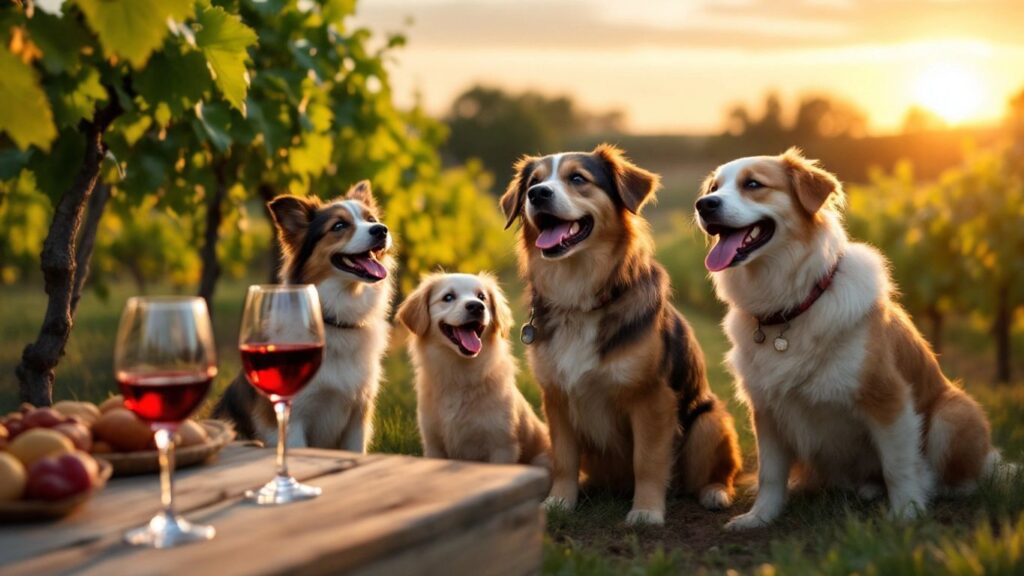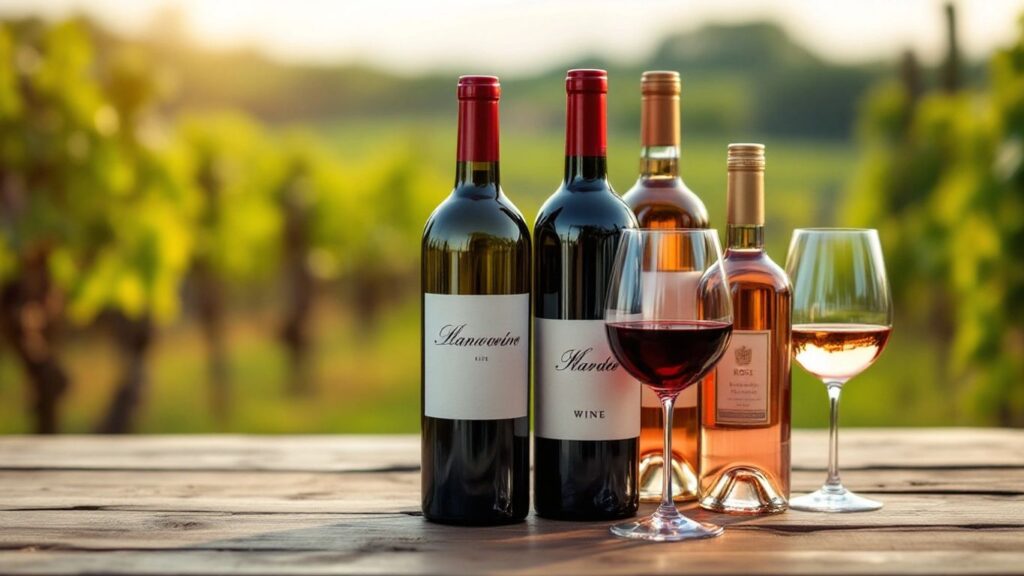Wine lovers who care about the planet can enjoy their favorite drinks while supporting eco-friendly practices. Many wineries now focus on sustainable methods that protect the environment and produce great wines.
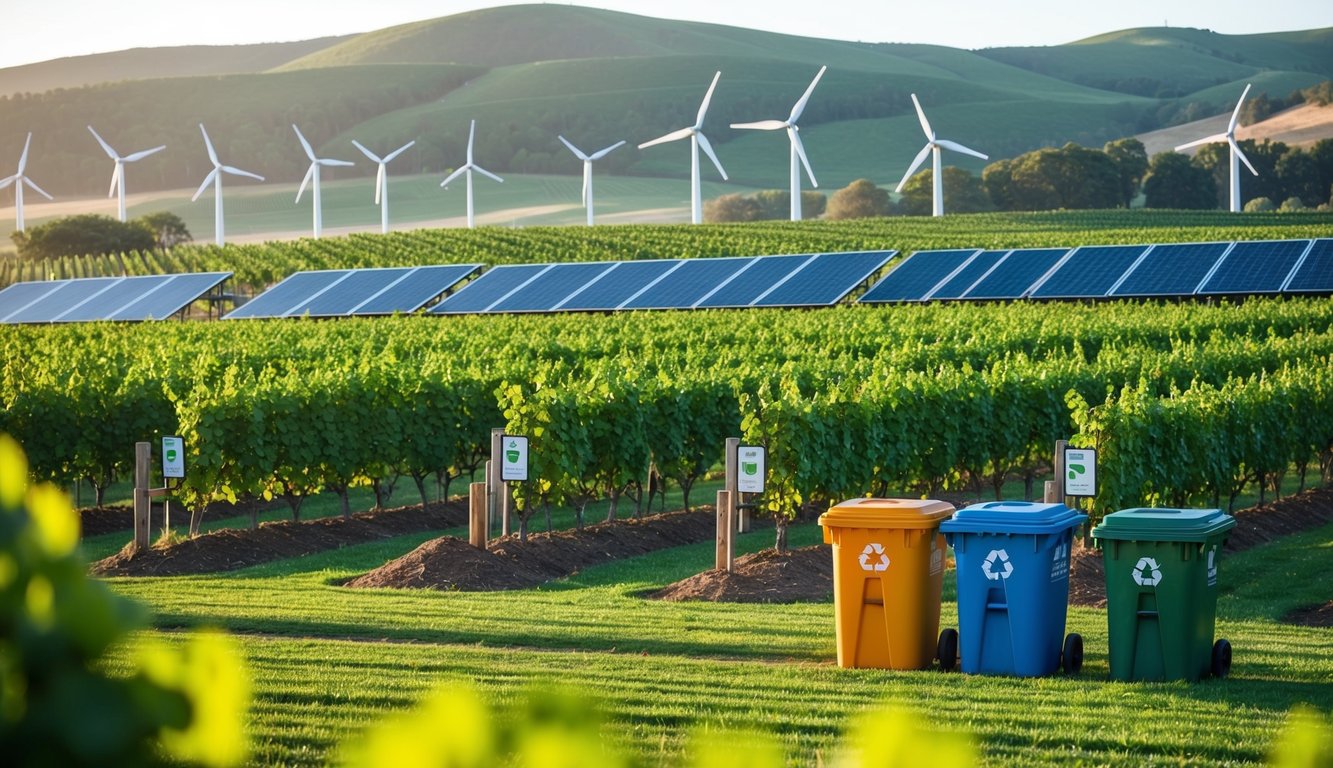
You can find sustainable wineries across the globe that make tasty wines without harming nature. These wineries use organic farming, reduce water waste, and protect local ecosystems. By choosing wines from these places, you help support green practices in the wine industry.
1) Frog’s Leap Winery – Napa Valley, California
Frog’s Leap Winery stands out as a leader in sustainable winemaking. Located in Rutherford, this Napa Valley gem has been committed to organic farming since its founding in 1981.
You’ll find that Frog’s Leap takes a unique approach to viticulture. They use dry farming techniques, meaning their vines are not irrigated. This practice encourages deep root growth and produces more concentrated flavors in the grapes.
The winery’s dedication to sustainability goes beyond the vineyard. Their buildings are powered by solar energy and use geothermal heating and cooling systems. You can feel good knowing that your wine consumption supports environmentally friendly practices.
When you visit Frog’s Leap, you can enjoy a range of excellent wines. Their Sauvignon Blanc and Cabernet Sauvignon are particularly noteworthy. The winery also produces Zinfandel and Chardonnay, among others.
Your tasting experience at Frog’s Leap is set in a charming restored red barn. The relaxed atmosphere reflects the winery’s motto: “Time’s fun when you’re having flies.” It’s a playful nod to their commitment to creating quality wines while respecting the environment.
2) Silver Oak Cellars – Sustainable Practices
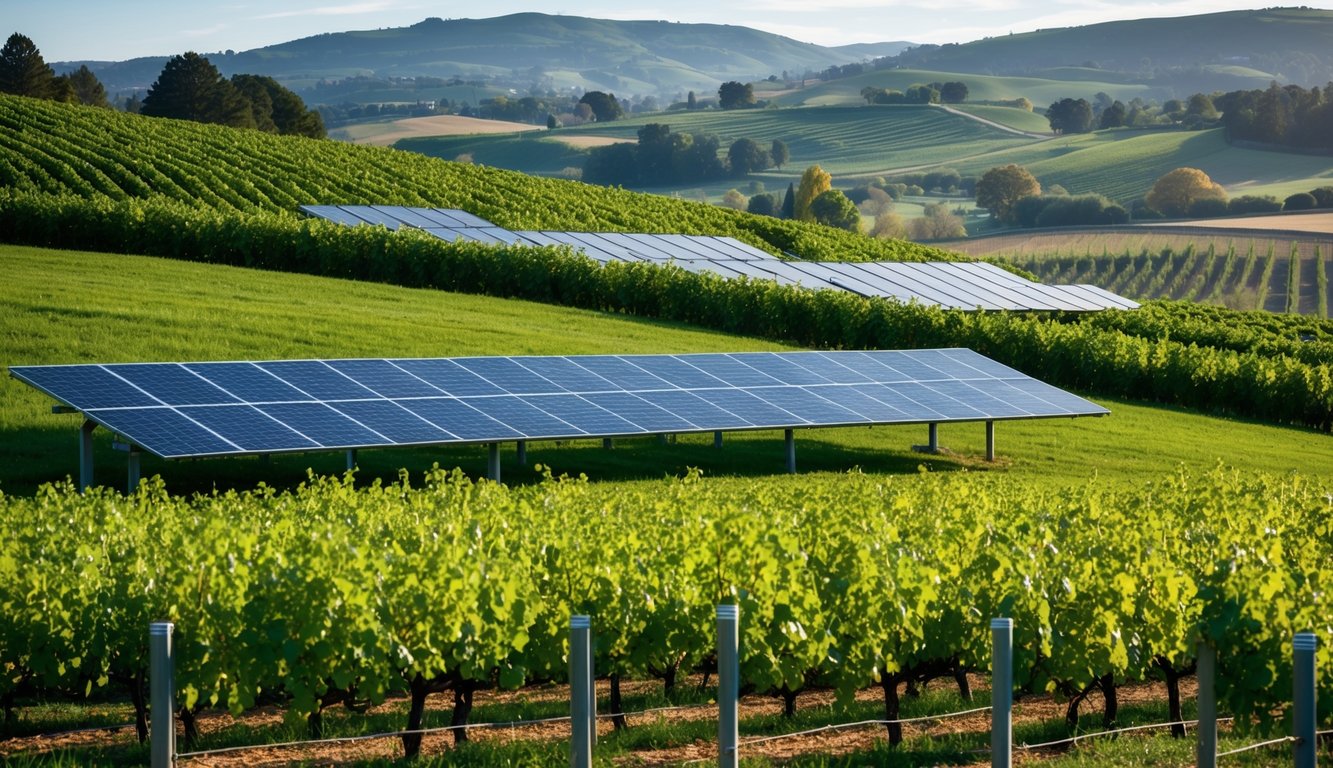
Silver Oak Cellars stands out as a leader in sustainable winemaking. This California-based winery has made impressive strides in eco-friendly practices.
Silver Oak’s commitment to sustainability is evident in its LEED Platinum certification. This is the highest level of recognition for green building design. Both their Napa Valley and Alexander Valley wineries have achieved this prestigious status.
The winery focuses on energy efficiency and renewable resources. They use solar panels to power their operations, reducing their carbon footprint significantly.
Water conservation is another key area for Silver Oak. They have implemented smart irrigation systems and water recycling programs to help preserve this precious resource.
Silver Oak also prioritizes sustainable farming methods. They avoid harmful pesticides and promote biodiversity in their vineyards. This approach ensures healthier vines and better wine quality.
You’ll find that Silver Oak’s dedication to sustainability extends to their packaging. They use recycled materials for their wine bottles and boxes, reducing waste and supporting a circular economy.
By choosing Silver Oak wines, you’re supporting a brand that puts the environment first. Their sustainable practices set a high standard for the wine industry.
3) Quintessa Estate – Organic Viticulture
Quintessa Estate stands out as a leader in sustainable winemaking. Located on a 280-acre property in Napa Valley, this winery is committed to organic farming practices.
You’ll find a balanced ecosystem at Quintessa. The estate uses holistic approaches to viticulture, promoting biodiversity and soil health. This helps create wines that truly reflect their terroir.
Organic farming is at the heart of Quintessa’s philosophy. They avoid synthetic pesticides and fertilizers, instead relying on natural methods to nurture their vines.
The winery’s design blends seamlessly with the landscape. Quintessa uses gravity flow in their winemaking process, reducing energy use and preserving wine quality.
When you visit, you’ll see firsthand how Quintessa’s commitment to sustainability shapes every aspect of their operation. From the vineyards to the cellar, environmental stewardship is evident.
Quintessa’s dedication to organic practices results in exceptional wines. You can taste the care and respect for nature in every sip of their renowned Bordeaux-style blends.
4) Tablas Creek Vineyard – Paso Robles, California
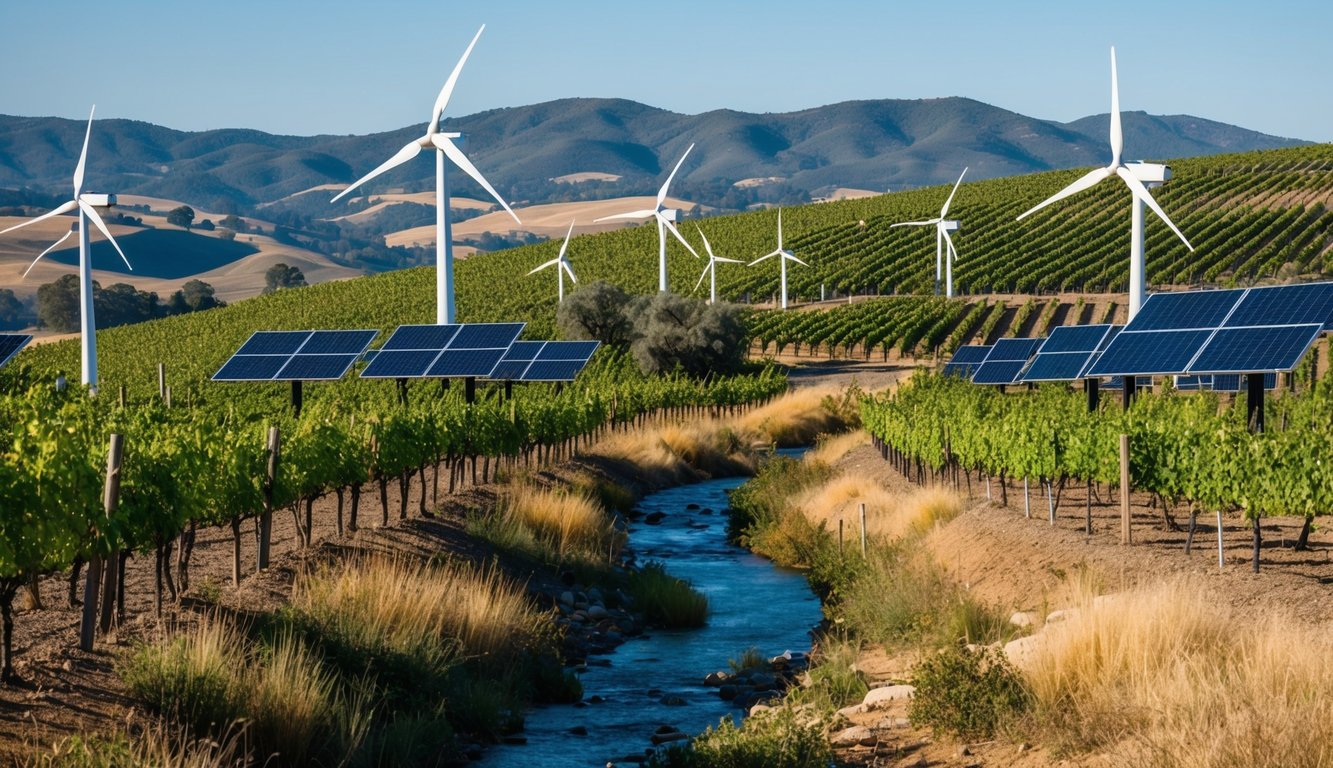
Tablas Creek Vineyard stands out as a leader in sustainable winemaking. Located in Paso Robles, California, this winery has made a name for itself with its eco-friendly practices.
You’ll find Tablas Creek committed to organic and biodynamic farming. They use natural methods to maintain soil health and control pests, avoiding harmful chemicals.
The vineyard’s dedication to sustainability goes beyond the fields. They’ve invested in solar power and water conservation techniques to reduce their environmental impact.
Tablas Creek is known for its Rhône-style wines. You can enjoy their eco-conscious offerings, including their popular Esprit de Tablas and Patelin de Tablas lines.
In a unique move, Tablas Creek has started offering high-end boxed wine. This packaging choice reduces waste and carbon emissions from transportation.
When you visit, you can tour the vineyard to see their sustainable practices firsthand. You’ll learn about their efforts to preserve biodiversity and promote a healthy ecosystem.
By choosing Tablas Creek wines, you’re supporting a winery that prioritizes the environment. Your purchase helps encourage sustainable practices in the wine industry.
5) Ponzi Vineyards – Certified B Corporation
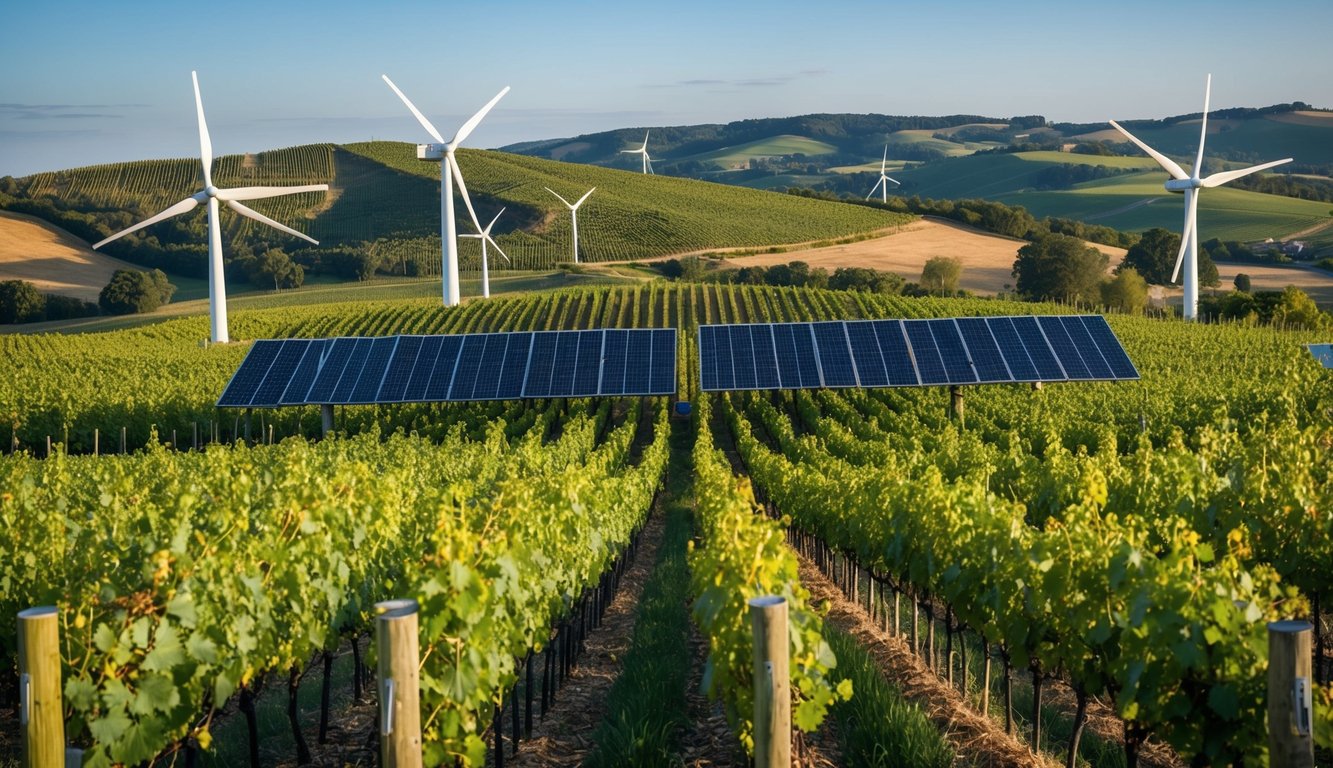
Ponzi Vineyards stands out as a leader in sustainable winemaking. Founded in 1970, this pioneering winery helped put Oregon’s Willamette Valley on the map as a world-class wine region.
You’ll find Ponzi Vineyards’ commitment to sustainability reflected in every aspect of their operation. Their low-intervention approach to winemaking and viticulture demonstrates their dedication to environmental stewardship.
In 2008, Ponzi Vineyards constructed a sustainably focused gravity-flow winery. This innovative design reduces energy use and minimizes the winery’s environmental impact.
Your visit to Ponzi Vineyards will showcase their state-of-the-art tasting room, built in 2013. Here, you can sample their acclaimed wines while learning about their eco-friendly practices.
As a Certified B Corporation, Ponzi Vineyards meets rigorous standards of social and environmental performance. This certification reflects their commitment to balancing profit with purpose.
When you choose Ponzi wines, you’re supporting a business that prioritizes sustainability. Their consistent high-level acclaim proves that eco-friendly practices can produce exceptional wines.
6) Benziger Family Winery – Biodynamic Wines
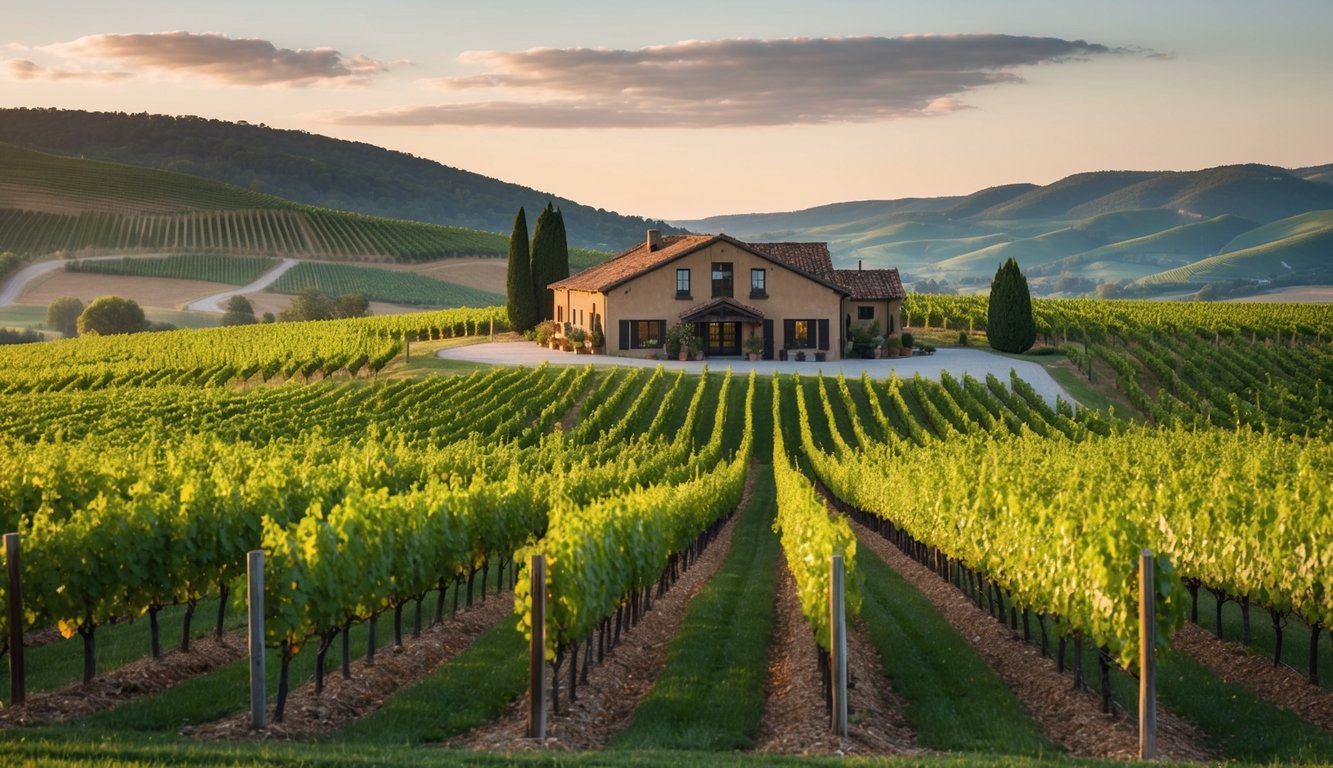
Benziger Family Winery stands out as a leader in eco-friendly wine production. Located in Sonoma, California, this winery has made a name for itself through its commitment to sustainable and biodynamic practices.
You’ll find that every Benziger wine is certified sustainable, organic, or biodynamic. This dedication to environmentally conscious methods ensures that each sip you take supports ecological balance.
The winery’s approach goes beyond just grape growing. Benziger creates a diverse ecosystem on their property, including gardens that attract beneficial insects and add beauty to the landscape.
When you visit Benziger, you can take part in their unique tram tour. This experience lets you see firsthand how biodynamic farming works in a vineyard setting.
Benziger offers a wide range of wines for eco-conscious drinkers. From crisp Chardonnays to bold Cabernet Sauvignons, you’re sure to find a sustainable wine that suits your taste.
By choosing Benziger, you’re not just enjoying great wine. You’re also supporting a winery that prioritizes the health of the planet in every bottle they produce.
7) Chateau Maris – Languedoc, France
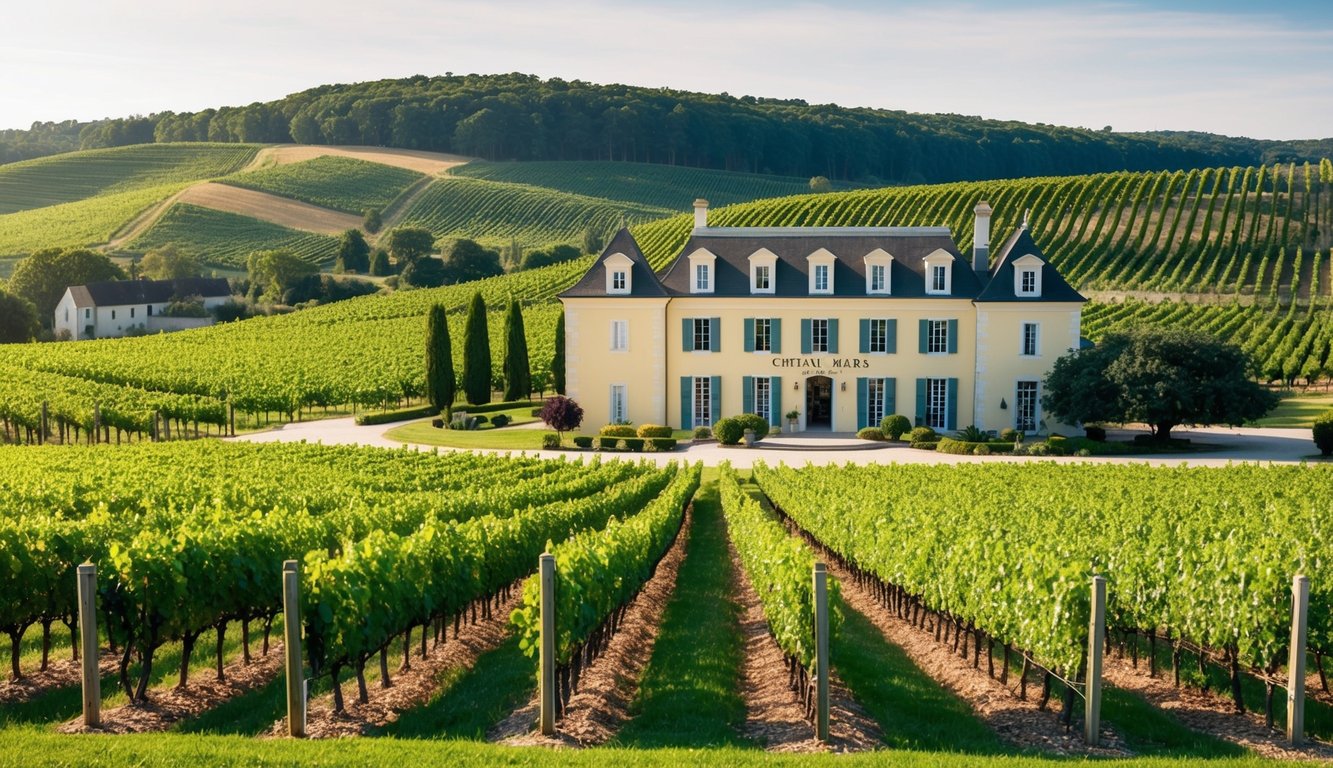
Nestled in the Languedoc region of France, Château Maris stands out as a beacon of sustainable winemaking. This winery has earned its place among the world’s most environmentally friendly vineyards.
At Château Maris, you’ll find a deep commitment to organic and biodynamic practices. The estate’s 79 acres are fully certified by Demeter and Biodyvin, ensuring the highest standards of ecological viticulture.
The winery’s dedication to sustainability goes beyond the vineyards. They’ve constructed a remarkable building made from hemp bricks, which naturally regulates temperature and humidity.
You can taste the difference in their wines. Château Maris produces exceptional bottles that reflect the terroir while minimizing environmental impact. Their approach includes using local manure for composting and hand-harvesting grapes.
As an eco-conscious drinker, you’ll appreciate Château Maris’ status as a Certified B Corp since 2016. This certification recognizes their commitment to social and environmental performance.
By choosing Château Maris wines, you’re supporting a winery that prioritizes both quality and sustainability. It’s a perfect choice for those who want to enjoy great wine while knowing they’re supporting responsible environmental practices.
Environmental Impact
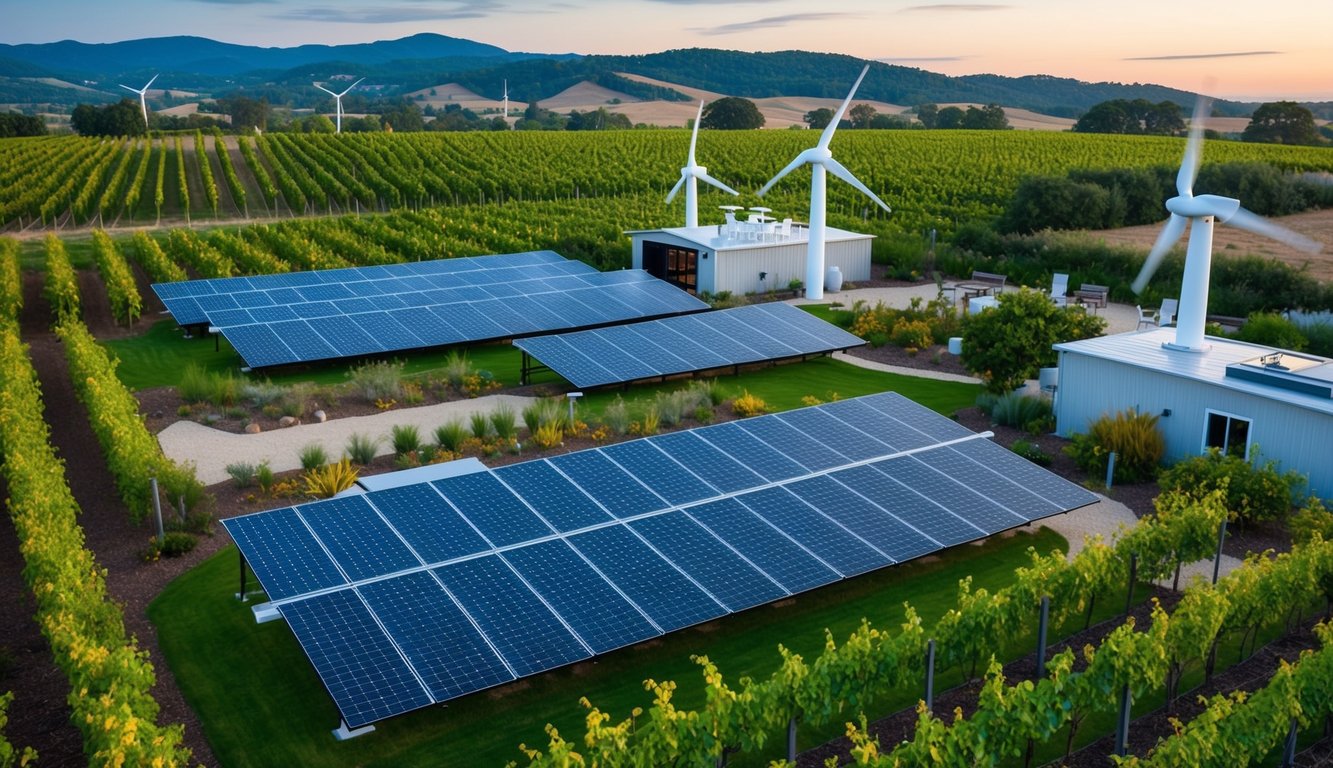
Sustainable wineries prioritize eco-friendly practices to reduce their carbon footprint. These efforts range from water conservation to renewable energy use. You’ll find many wineries implementing innovative techniques to protect the environment.
Sustainable Farming Practices
Sustainable wine production focuses on minimizing environmental harm. Many wineries use cover crops to improve soil health and reduce erosion. You’ll see water-saving techniques like drip irrigation becoming more common.
Some vineyards employ natural pest control methods. These include encouraging beneficial insects and birds. You might notice owl boxes or insectaries around the vines.
Energy efficiency is another key aspect. Solar panels and wind turbines are popping up at wineries. Some even use electric vehicles for vineyard operations.
Waste reduction is crucial too. Many wineries compost grape pomace and recycle packaging materials. You’ll find some using lightweight bottles to cut transport emissions.
Biodynamic and Organic Certifications
Organic and biodynamic certifications are gaining popularity in the wine industry. Organic wineries avoid synthetic pesticides and fertilizers. You’ll taste wines made from grapes grown without harmful chemicals.
Biodynamic farming goes a step further. It treats the vineyard as a self-sustaining ecosystem. You might see unusual practices like burying cow horns filled with manure.
These certifications have strict standards. Wineries must undergo regular inspections to maintain their status. You can trust that certified wines meet specific environmental criteria.
Some wineries choose to follow organic or biodynamic practices without certification. Ask about their farming methods when you visit. You may discover hidden gems committed to sustainability.
Innovative Sustainability Strategies

Many wineries are taking bold steps to reduce their environmental impact. They’re using cutting-edge methods to save energy and cut waste.
Renewable Energy Initiatives
Some wineries are turning to solar power to meet their energy needs. Macari Vineyards in New York uses solar panels to power their operations. This helps them lower their carbon footprint.
Wind energy is another popular choice. Some vineyards have installed wind turbines on their property. These generate clean electricity for the winery.
Geothermal systems are gaining traction too. They use the earth’s natural heat to warm and cool buildings. This cuts down on energy use for heating and air conditioning.
Waste Reduction and Recycling
Wineries are finding creative ways to reuse grape waste. Many turn leftover grape skins and seeds into compost. This natural fertilizer enriches the soil for future crops.
Some innovative wineries are using grape waste to make other products. These include:
- Grape seed oil
- Brandy
- Organic skincare items
Water conservation is a big focus. Drip irrigation systems help wineries use less water in their vineyards. Some also collect rainwater to use during dry spells.
Packaging is another area where wineries are making changes. Lightweight bottles reduce shipping costs and emissions. Some are even trying out alternative packaging like boxes or cans.
